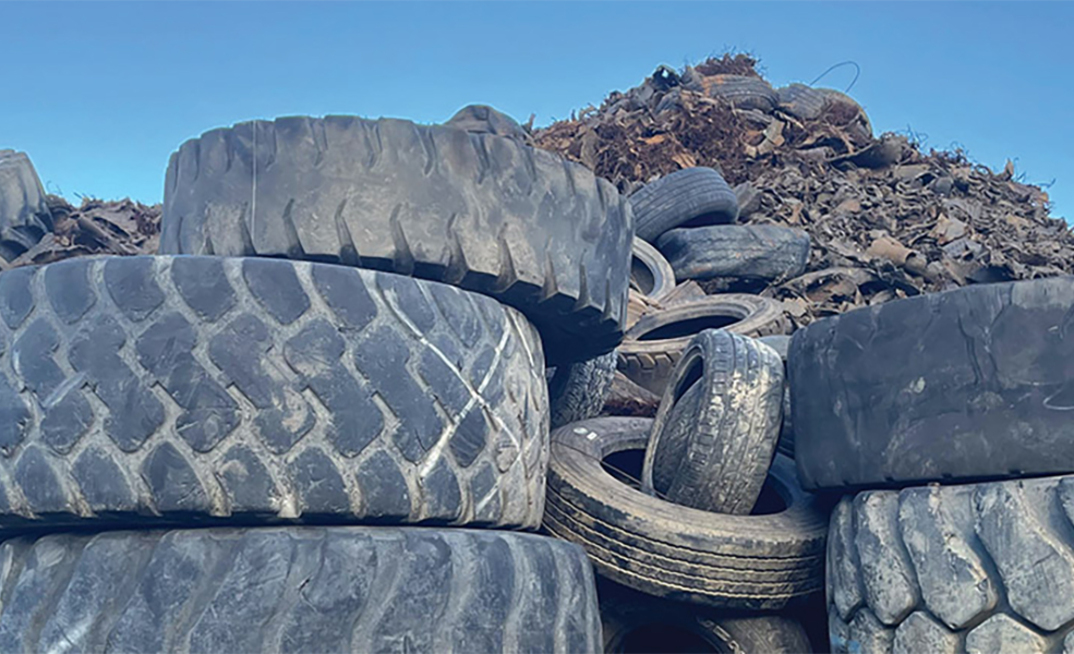Everyday hundreds of thousands of tonnes of rubber hits the outback roads at mines all around the country and rubber conveyor belts move resources vast distances to keep Australia's mining exports running at full steam. Eventually, even these tough tracks crack, and of the 120,000 tonnes of rubber from tyres that reach the end of their lives each year, only 14% is repurposed.
Majority are buried onsite at mines, others make their way to landfill. Not only is this an environmentally unfriendly solution, it is also a wasted opportunity as these tyres have the potential to be transformed into useful products.
"Change is coming and what was once acceptable, now isn't," Tyre Stewardship Australia CEO Lina Goodman says.
TSA, a not-for-profit organisation made up of stakeholders from across the entire tyre supply chain, was established to effectively reduce the environmental, health and safety impacts of tyres and promote the development of viable markets for tyre-derived products.
"There is positive momentum in the market, and some players have already emerged and are taking advantage of the new opportunities.
"Mining companies need to be asking their suppliers - ‘are you contributing to the scheme' - contribution means that TSA can facilitate solutions to advance resource recovery for the sector and potentially create new jobs in regional and remote communities."
TSA says its changemaking work is not going to be an ‘easy fix' but collaboration across the entire sector and also the communities that have vested interest in how tyres are managed will yield positive results.
"TSA's work aims to facilitate and demonstrate real world solutions that will improve resource recovery of tyres, conveyor belts and rubber tracks in the mining and other OTR sectors," she says.
"Whilst it is evident that recovery processes for OTR tyres are limited and also difficult to manage, transport and handle, the time has come to question what was once acceptable and look at alternate options - both locally or globally - that can address the issue of processing tyres which are currently abandoned when they reach the end of their useful life," Goodman says.
Australia sits in the region with the largest market for OTR tyres, with revenue of up to A$12 billion expected by just 2024 in the Asia Pacific, as Asia's demand for mined products, predominantly coal and iron ore increases.
Over the past five years Australia has consumed an average of around 134,000 tonnes of OTR tyres per annum. On a tonnage basis, the mining and agriculture sectors have dominated consumption, representing around 75%.
An estimated 14,400 tonnes or 12% of used OTR tyres were exported overseas for processing in 2018 -19.
From 1 December, the Federal Government has banned the exportation of whole used and baled tyres. With export bans looming and greater emphasis on Australia being custodians of their own waste, TSA was one of a number of Product Stewardship Schemes to receive a government grant via the National Product Stewardship Investment Fund. The grant will be used solely on a dedicated project to improve the recovery rate of OTRs.
"The project will concentrate on the entire OTR sector including mining, aviation, agricultural and manufacturing tyres, essentially any tyre that is considered off-the-road and also conveyor belts" Goodman said.
Working with stakeholders across the mining and other sectors, TSA will present the Federal Government with a multifaceted roadmap to better manage issues surrounding the safe and sustainable disposal of OTR tyres, while also encouraging more recycling and improving their end-of-life prospects.
TSA has established a working group made up of peak bodies including the Minerals Council of Australia, mining companies, community groups and indigenous representatives as well as tyre manufacturers of the related products.
These groups will guide the project via members' experience, research and practical outcomes designed to be adopted Australia-wide to provide governance and oversight.
"Now we are seeing a growing number of organisations willing to invest, partner and engage with the sector to recover this value product," Goodman says.
Goodman describes the organisation's work as ‘a hands-on project'.
"TSA intends to run pilots and demonstrations to better roadmap possible solutions, with a central focus on removing barriers to resource recovery.
"The pilot program aims to stimulate investment and develop business opportunities around tyre recovery and find markets for products made from tyre-derived products.
"Research projects will be conducted including a global study of the end-of-life market, including stewardship schemes, incentives to recycle tyres and investment programs to improve recovery rates."
Goodman says TSA is of the view that if it can create a market for recycled products it will drive retention and collection, creating a greater product base to upscale recycling, thus increasing investment as costs fall.
It will identify current recycling partners, processing options and pathways for increased recycling and consumption of end products. Most importantly it will develop a cost structure and critical infrastructure and the operations needed to expand work and opportunities.
There are some partnerships already in place to support recycling which TSA hopes to see expanded nation-wide. A joint venture between Tyrecycle and Kariyarra Contracting currently exists in the Pilbara region and funding from the Western Australian government to organisations 4M Waste and Elan Energy are just some examples of investment to the sector, all aimed at addressing the OTR sector.
The community is beginning to expect more from mining companies' waste management and recycling OTR tyres is part of that. Onsite burial of tyres is increasingly unacceptable. For those who wish to get involved and be part of the positive change coming to the mining sector or simply learn more, contact TSA on getonboard@tyrestewardship.org.au.
ABOUT THIS COMPANY
Tyre Stewardship Australia
HEAD OFFICE:
- 2/59 Keele Street, Collingwood, VIC 3066, Australia
- Phone: 03 9977 7820
- Website: www.tyrestewardship.org.au
- Email: getonboard@tyrestewardship.org.au

























